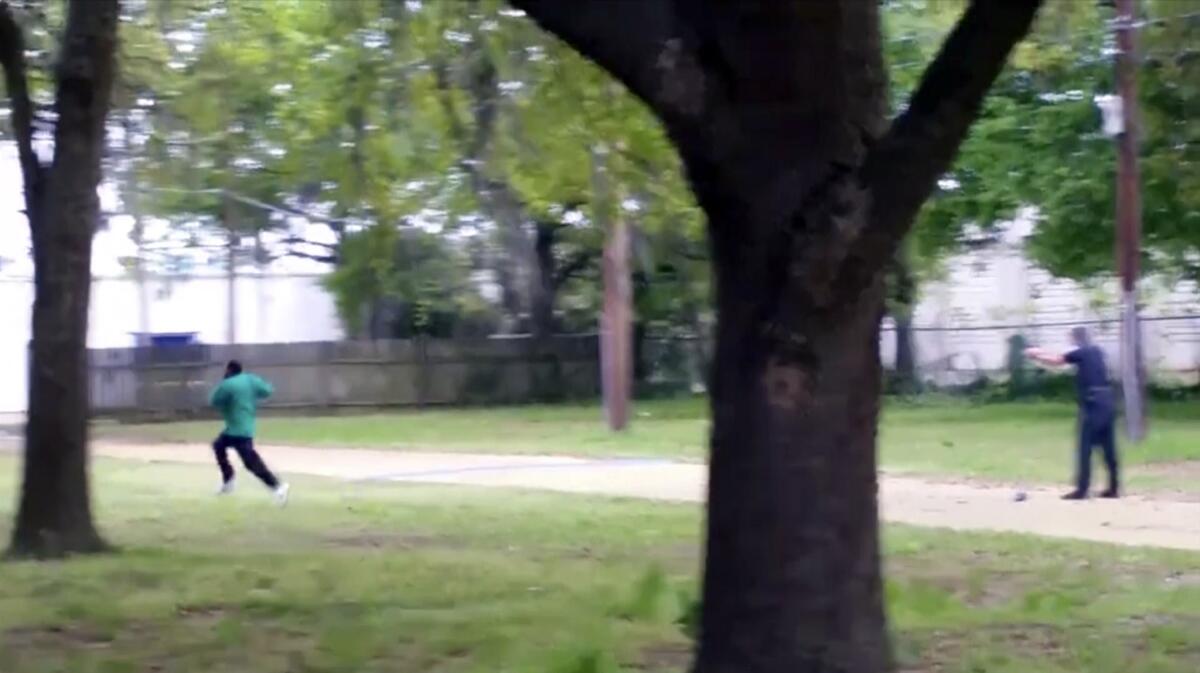Michael Slager, officer who fatally shot Walter Scott in South Carolina, pleads guilty in federal case

In addition to the federal charges, Slager faces a criminal trial in state court for murder.
- Share via
In a dramatic turn of events, a former South Carolina police officer who spent two years fighting charges in a high-profile shooting of an unarmed black man pleaded guilty Tuesday in his federal case.
Michael T. Slager entered his plea in federal court in Charleston, S.C., more than two years after he fatally shot Walter Scott five times as Scott ran away after being pulled over for a broken car brake light.
Slager pleaded guilty to one federal charge of violating Scott’s civil rights. In exchange, two other federal charges against him will be dropped, as will a state murder charge, according to his plea agreement.
The move allows Slager, who was an officer in North Charleston at the time of the shooting, to avoid a jury trial.
U.S. District Judge David Norton of the South Carolina District will decide Slager’s sentence, which could be life in prison. With a guilty plea, Slager has a better chance at a lesser sentence. Under the plea agreement, the federal government will advocate for Slager’s crime to be treated as a lower-level offense.
“The Department of Justice will hold accountable any law enforcement officer who violates the civil rights of our citizens by using excessive force,” Atty. Gen. Jeff Sessions said in a statement. “Such failures of duty not only harm the individual victims of these crimes; they harm our country, by eroding trust in law enforcement and undermining the good work of the vast majority of honorable and honest police officers.”
Slager entered his plea during a pretrial hearing Tuesday in Charleston before being handcuffed and led out of the court by U.S. marshals. The trial was scheduled for May 15.
“We hope that Michael’s acceptance of responsibility will help the Scott family as they continue to grieve their loss,” Slager’s lawyer, Andrew J. Savage III, said in a statement.
Speaking after the hearing, Scott’s oldest brother, Anthony Scott, said “the healing begins today” for the family.
“I knew from Day One there was something wrong with the picture,” he said. “My brother was violated. He was gunned down running away, and this gentleman continued to stick to that story, but today he told the truth. He said he did it. That’s our victory.”
The April 2015 shooting of Scott, 50, was recorded on cellphone video by a bystander. The video became a rallying point of protests nationwide against a series of high-profile deaths of African Americans at the hands of police, including Eric Garner in Staten Island, N.Y., and Michael Brown in Ferguson, Mo.
But Slager’s case stood out for a rarity in police shootings: In May, a grand jury indicted him on federal charges.
The indictment said that Slager used excessive force in violation of Scott’s civil rights when he shot Scott and that he falsely told state investigators under oath that he fired as Scott moved toward him with a Taser. Slager also was charged with use of a weapon during a civil rights offense. The indictment said the shooting was “without legal justification.”
At the arraignment, Slager pleaded not guilty.

Tuesday’s guilty plea followed weeks of wrangling over Slager’s trial. Defense attorneys had tried to limit testimony and evidence, including a request to toss out the video of the shooting.
In addition to the federal charges, Slager faced a criminal trial in state court for murder. Before Tuesday’s plea agreement, that trial had been scheduled for August. In December, Slager’s first trial on the state murder charge ended in a mistrial because of a deadlocked jury.
In a statement, South Carolina Solicitor Scarlett Wilson, who led the state’s case against Slager, praised the developments Tuesday.
“We found justice in a resolution that vindicates the State’s interests by holding former police officer Michael Slager accountable for shooting Mr. Scott (in the back) when Slager knew it was wrong and illegal; as well as justice in a resolution that recognizes the egregious violation of Mr. Scott’s civil rights,” Wilson said.
“Soon, a federal judge will decide what name and label to give the killing of Walter Scott. The same judge will determine what punishment former Officer Slager should receive.… We have confidence in the comprehensive federal sentencing process and we will continue to support the federal government’s efforts in any way that is necessary and appropriate,” she said.
Slager’s case has been viewed as a test of the justice system when it comes to police who shoot unarmed civilians, particularly shootings of blacks by white officers. In many high-profile police shootings in recent years, grand juries and the public have been divided as to whether officers should face charges.
But in Slager’s case, city officials and even fellow officers said video showed that Scott did not present a danger and should not have been shot.
David Harris, a law professor at the University of Pittsburgh whose research focuses on police, said the case was “unusual” and called the plea “surprising.”
“They were able to get a mistrial once. There was no guarantee they could get it again,” Harris said. “The risk was great in going to trial. Pleading guilty does take some of the risk of the ultimate sentence off the table.”
Harris said the video of the shooting, and Slager’s own statements contradicting what was in the video, were probably “key issues” in the guilty plea.
After the shooting, Slager said he fired his weapon after using a Taser on Scott because he felt threatened.
“Shots fired, and the subject is down. He took my Taser,” Slager said at the time of the shooting, according to reports.
But the video, released three days after the April 4, 2015, shooting, showed events differently. Scott, with his back facing the officer, is unarmed and running as he is shot from at least 17 feet away.
The day of the video’s release, North Charleston’s mayor held a news conference calling out the officer.
“When you’re wrong, you’re wrong,” Mayor Keith Summey said. “And if you make a bad decision, don’t care if you’re behind the shield or just a citizen on the street, you have to live by that decision.”
Slager was arrested that day and fired from his job that week.
In October 2015, the Scott family settled out of court with the city of North Charleston for $6.5 million.
Jaweed Kaleem is The Times’ national race and justice correspondent. Follow him on Twitter, Facebook and Instagram.
ALSO
In funeral sermon for Walter Scott, pastor decries ‘act of racism’
Man who recorded Walter Scott shooting says his life has changed forever
Opinion: Cops shoot and kill someone about 1,000 times a year. Few are prosecuted. What can be done?
UPDATES:
6 p.m.: This article was updated with comments from Sessions and analysis from a law professor.
12:10 p.m.: This article was updated with Michael Slager pleading guilty.
9:35 a.m.: This article was updated with comments from Michael Slager’s lawyer and additional details on the plea.
This article was originally published at 7:45 a.m.
More to Read
Sign up for Essential California
The most important California stories and recommendations in your inbox every morning.
You may occasionally receive promotional content from the Los Angeles Times.











